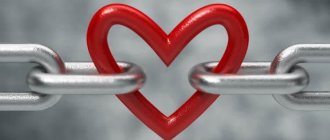Oleg Torsunov once told a woman at his lecture:
“If you had true love for your husband, you would wish him happiness with the other woman he left for. After all, he told you 100 times that he is better off with her than with you. But you want to enjoy this man, so you think that he will be better off with you and therefore you want to return him. This is not love".
The phrase “I can’t live without you” does not always express love. It can also mean that you are simply needed, or that you desperately need someone.
Emotional dependence is a condition when a person thinks that he will not be able to live normally without his partner, or that he will never find happiness without him.
Emotionally dependent people require constant attention, approval and support, because they cannot support and motivate themselves. They want to fill their inner emptiness at the expense of another person. In addition, some people are so afraid of loneliness that they agree to any relationship, even if it means losing themselves and their identity.
Let's look at 6 differences between love and emotional dependence:
Love = trust
If this is love, you do not worry when your partner actively communicates with other people, because trust is the basis of love. With emotional dependence, you feel jealous or even threatened that these people are stealing your partner's time and attention, which should belong only to you.
At the same time, your self-esteem is mainly determined by your partner’s attitude towards you. And if, for example, he leaves for a few days or goes to a high school reunion, you lose peace of mind, imagine scary scenarios in your head and are constantly worried.
What is love addiction?
Love addiction has become an area of my professional interest. For many years I have worked with people who have difficulty finding the right partner and creating a healthy union, who are caught in a vicious cycle of pain and disappointment in themselves and others.
They believe that the problem is either that they found the “wrong” person or that the love has “faded.” Some people jump from one relationship to another in pursuit of the wonderful feeling of being in love. Others remain in relationships despite feelings of dissatisfaction, secret thoughts of breaking up, and soon develop emotional (or very real) affairs on the side, without understanding the root of the problem.
Let's be clear: Addiction of any kind is a compulsive (that is, repeated against the will) and chronic (long-term) pattern of using a certain substance or behavior in order to achieve a state of comfort or arousal in order to “cure” distressing emotions and feelings. Addicts tend to continue using their drug despite the negative consequences of addiction.
Sexual addiction is a compulsive pattern of pursuing sexual stimulation without emotional attachment. Love addiction is more difficult to define, because by our nature we are all dependent on love in one way or another: we crave it and need it, we think about it. We all need affection to survive, and we intuitively strive to form connections with other people, especially romantic ones. There is nothing unhealthy about this desire for love.
Love addiction is a compulsive, chronic craving for romantic love in an attempt to fulfill one's need for a sense of security and self-worth through another person. At the stage of falling in love, the need seems to be fulfilled, but as soon as the feelings naturally reduce their intensity, disappointment and emptiness return. The negative consequences of such unfulfilled expectations can be devastating, but the addict enters into relationships again and again, continuing to believe that love can improve his life.
Based on my experience, the most difficult love addicts to treat are those who build relationships with several people at once and torment themselves with the question of who to choose. They really believe that the main problem here is to decide which partner is “the one.”
Love = acceptance
If this is love, you live and let others live. Love is acceptance and understanding. With emotional dependence, you try to pretend to be someone you are not and also expect your partner to behave in a certain way.
When you depend on a person, you also try to adapt and change yourself according to their preferences, needs and whims. In other words, you allow it to direct, define and control your life.
Where does love addiction come from?
The causes of love addiction are not difficult to recognize: insufficient care and attention from significant adults, low self-esteem, lack of positive examples of healthy relationships, socially imposed beliefs about ideal romantic love (“and they lived happily ever after”).
But, unfortunately, understanding where you have this problem does not help solve it. Information is not able to take and change the unconscious desire to find a mate at any cost.
After leaving a dysfunctional relationship, my clients often say:
“Wrong guy! I'll never fall for something like that again. Next time I’ll find someone who’s nothing like this.”
“I don't want to date anyone. I just want to spend time with someone occasionally.”
“Next time I won’t rush into a relationship.”
Unfortunately, it doesn't work. Here are some facts about where love addiction will lead you if you enter into a new relationship without learning from your painful experiences:
1. If you are looking for the complete opposite of your previous partner, remember that the opposite of a sick person is a sick person! With this approach, you simply jump from one extreme to the other and end up in the same place - in a destructive relationship.
2. Your new “just friend”, with whom you will “occasionally” spend time, will sooner or later turn into your next lover, and everything will end the same as before.
3. Saying that next time you will “take your time” will remain just words when the hormones kick in and your crush starts making decisions for you. And love is blind.
The truth is this: wherever you go, you will end up back there. The problem is your behavior patterns, not your partner.
Love = compromises
If it's love, you want to solve problems together and know how to listen to each other. Love is hard work and a willingness to compromise, because you will definitely have contradictions, disagreements and even mood swings, but you try to find a common language and cope with any situation.
When you are dependent, you obey your partner’s opinion and do not voice your point of view. You give in, submit and agree to your partner's dominance and pressure. Your views are never taken into account because you are too afraid to stand up for them.
Signs of love addiction
First, answer these questions honestly.
1. Have you ever thought that if someone loved you “in a special way”, you would be happy for the rest of your days?
2. Have you been obsessed with dreams of such love as in movies, books, songs?
3. Have you ever convinced yourself to love someone you weren't particularly attracted to because you needed a loving relationship right now?
4. Have you ever felt that you need to help your partner change his life already in the early stages of a relationship, but did not consider the option that he (s) is simply not suitable for you and it would be wiser to leave?
5. Have you stayed in an unhealthy relationship for a long time or returned to the same ex-partner repeatedly because you couldn't stand being alone?
6. When you're in a serious relationship, do you wonder if this is the right partner, or fantasize about a past lover, wondering if you'd be happier with him than with your current partner?
7. Do you tend to describe your vision of an ideal relationship with the expressions “made for each other”, “soul mate”, “other half”?
8. Since adulthood, what is the longest period that you have gone without being in a relationship and not worrying about it?
9. After a breakup, do you give yourself time to recover and come to your senses, or are you in a hurry to find a new lover?
10. Do you expect your partner to make you feel worthy of love and acceptance?
I won't ask you to score your answers. You already know who you are!
If, while answering these questions, you feel a vague doubt that you must be a love addict, don't beat yourself up too much. I was a member of this club myself for most of my life. I was also in love with love.
Love = development
If it is love, you grow and develop as a person. When you become emotionally dependent on another person, you stop being yourself and give up on your aspirations and dreams.
In a dependent relationship, your entire world revolves around your partner. You can only think and care about his preferences and needs. You also try to justify his bad behavior and sometimes hide his inappropriate behavior from others. In love, it's the other way around: you help each other become the best version of yourself.
How dependent relationships develop
- Refusal of one's own territory and dissolution in the partner's territory. Such a dependent lives only in the interests of his “half,” and his whole life is aimed at satisfying the interests and desires of his “loved one.” For example, a wife gives up her career and takes care of her husband’s affairs, literally “looking” into her mouth in anticipation of new wishes. The “beloved” person is given full responsibility for the life of the addict. He begins to play the role of a parent.
- Absorption of the psychological territory and space of a loved one, depriving him of all independence and sovereignty. In this case, the role of parent-educator is played by the person seeking love. He directs and controls his partner as if he were his child. Of course, he does this “for the good” because she knows what is best for the other. The only question is how does he know? He takes responsibility for the life of his loved one without asking.
- Possession and complete destruction of the psychological territory of one's partner whom this person "loves". Here, complete power prevails over the partner, who is already seen as a free application or thing. Such power over a partner makes you feel very significant and important. Responsibility for the life of a partner is only spoken about out loud; in fact, the partner is only used. Power over a partner, control over him, and the ability to manage feelings and actions are developed.
- Self-reflection in the “beloved” person. In this case, a convenient partner is chosen who will show day and night that the one who loves him is simply an extraordinary person. This partner should admire him, satisfy all his desires, idolize him. This partner must literally prove that this person is better than everyone else and deserves the best love. If this partner ceases to serve as a “mirror”, a replacement is immediately found for him in the form of another partner.
Signs of an addicted person
In conclusion, we would like to remind you of the signs of an addicted person:
- 1. An addicted person stops communicating with people of the opposite sex, unless work and friendship oblige him to do so. Such a person also stops flirting with people of the opposite sex if he already has a regular partner
- 2. A dependent person worries about his every action, especially if his partner might not like it.
- 3. A dependent person demands too much and too much attention, which can irritate his partner.
- 4. If a partner lingers somewhere, the addict greets him with scandals and suspicions
- 5. An addict very often gets offended by little things that exist in any relationship. They seem like a big problem to him.
- 6. A dependent person is very afraid of being abandoned and rejected, and is also worried that someone will encroach on his “property” - his partner.
- 7. In the eyes of his friends, an addict always justifies his partner’s actions and takes the blame upon himself.
- 8. A dependent person most often considers his partner better than himself.
- 9. Such a person expects from his partner what he can never give him.
- 10. Thinks about her partner many times a day.
- 11. The first place for an addicted person is to satisfy the interests and needs of his partner
- 12. Life seems an unbearable burden for the addict; it ceases to seem easy and free to him.
We wish everyone a good day! Love and take care of each other, not forgetting the uniqueness of each person, both his and your freedom!
Main reasons for the phenomenon
The causes of emotional dependence go deep into childhood. It is then that security and a sense of self-confidence are formed in relationships with parents. But there are situations when a child does not receive enough love, which leads to problems in adulthood. Most often this happens in the following cases:
- Parents are afraid or simply do not know how to show their emotions. They dress, teach, feed, buy toys, but do not talk about their feelings, do not praise for achievements. Often such parents forbid the child to show his emotions and talk about his desires.
- Children lose their parents early. One of the parents or both died at once; it is possible that they were deprived of the right to raise the child. It doesn’t matter - the child was left without main support. Other people, no matter how close they may be, will not be able to fill this void; the feeling of abandonment remains forever. It is especially difficult for children who end up in a shelter.
- Parents are immersed in work or leaving to earn money. The child feels abandoned, despite the fact that he is left with his beloved grandmother. He does not receive enough of the emotions that only mom and dad can give. Divorce also affects children, especially if one parent completely disappears from their lives.
- Relatives ignore the child's needs. The main needs of children are safety and love. They see them in the actions of their parents: when they feel sorry, support, admire victories, buy toys, read fairy tales. When a child hears: “don’t cry, you’re not little,” “wait, I don’t have time,” “it’s my own fault,” “why do you need this toy, it’s a waste of money,” he feels unnecessary and withdraws into himself.
- Parents raise a “comfortable” child. He grows up with the understanding that he must earn love: if he doesn’t do something, it means he won’t be loved. If a girl grew up in such conditions, in the future she will become a “comfortable” wife who will revolve around her husband and fulfill all his desires. She will not have her own personal life, and over time she will get bored with her husband, and he will leave her for a self-sufficient mistress.
These are the main reasons for the emergence of emotional hunger, and addicts begin to look for opportunities to “patch up” these gaps in love relationships. But no partner can give them this. From an independent person they can only receive the adult love of a man or woman.
To fill yourself with missing feelings, you will have to work on yourself. Psychologists help with this - not just to understand the reasons, but also to correctly apply the techniques created in order to get out of this vicious circle.
Causes of emotional dependence
Dependence on another person arises from one’s own emotional emptiness. There are several reasons for this phenomenon:
- Lack of personal goals. A person lives according to rules imposed by someone, often by his parents. His every action is aimed at meeting the expectations of other people. In this case, relationships with a man will be built on the same principle. A woman with such a problem simply does not know how to build relationships differently. Therefore, she continues to live for the sake of another person, being sure that this is her goal.
- Emotional emptiness. A person who is dissatisfied with his life may try to compensate for this feeling in a relationship. As a rule, people who are bored alone with themselves are susceptible to this.
- Low self-esteem. A woman who does not realize her worth will subconsciously seek approval from other people. This often results in codependent relationships.
- Fear of responsibility. If a person is afraid to take responsibility for himself and for his actions, he will subconsciously look for a partner who will do this for him. This is how emotional dependence on another arises.
- Childhood trauma. Dependence in relationships often occurs in people who did not receive enough love and support from their mother. As an adult, such a person will strive with all his might to receive such emotions.
- The position of the victim. This reason is closely related to the fear of responsibility. People with a victim attitude shift the blame to others. They consider themselves misunderstood and undervalued by society, focus on negative emotions, and often suffer from low self-esteem. Women with this way of thinking fall into emotional dependence on any man who shows interest in them, is courteous and attentive.
Additionally, this feeling may arise from a traumatic experience in the past. So, a woman can make a man the center of her life only out of fear of losing the relationship.
How to get rid of emotional dependence
If you find yourself in this situation, you first need to realize that this is an unhealthy relationship. Such feelings destroy the personality, as the woman literally dissolves in the man. It’s even worse if he contributes to this in every possible way, deliberately creating situations because of which you will become even more dependent on him emotionally. In this case, comprehensive joint work on relationships is necessary in order to build a harmonious union.
What to do if you are emotionally dependent on a man:
- Start living by your own rules. If you have been in this position for a long time, it will be difficult at first to accept responsibility for your life. Moreover, many simply do not understand their real desires. Do this exercise: every time you feel like you are agreeing with a man because of an emotional attachment, listen to yourself. Ask yourself the question: “What do I really want?” Do this every time you act according to an established scenario. To be on the safe side, you can start writing down your real desires in a notebook. This way you will gradually begin to separate your feelings from the emotions of the other person. In Spiritual Economics there are these words: “The wisdom of a man of understanding is knowledge of his way” (SYN, Proverbs 14:8). Find your path, and then your life will be interesting and fulfilling.
- Understand your worth and work on your self-esteem. Here the course “I am happy, and every day brings me joy (she is a psychologist)” will come to your aid.
- Engage in self-development. Very often, dependence on another occurs in people who simply do not know what to do with their lives. Find a new creative hobby, gain new skills, and pursue professional growth. So you will see that life is interesting and multifaceted, and you have been limiting yourself for so long in vain.
Once you can identify your own emotions, look for what might be fueling them. Perhaps you get joy from creativity, are charged with positivity from walks in nature or reading fiction. As soon as you understand this, determine a new format for communicating with a man and discuss it with him. The “Woman of God” marathon and the course “How to create harmonious relationships in which there is romance, and you are supported, understood and heard” will help you build harmonious relationships.
How to confront the problem
Emotional dependence is an unhealthy attitude, first of all, towards yourself; it destroys you. And to get rid of it, you need to go through several steps:
- First of all, accept that attachment is painful and far from a normal relationship.
- Start to love yourself first: take care of yourself, make time for hobbies, communicate with new people. Just start living.
- Don’t expect your partner to fill your emotions, learn to find them without him. Start with little things: eat ice cream in the park, go out to a cafe with a friend, go to the cinema, go to a bookstore and choose literature of your interests.
- Work with your fears. Only by overcoming them can you find harmony in a new relationship.
Emotional dependence is a pathology that destroys. The reasons for it originate deep in childhood, and in order to overcome this condition, you need colossal work on yourself. At the Academy of Conscious Thinking, I will help you understand the problem in detail and find a way out of it. You will learn to build new, strong and healthy relationships.











